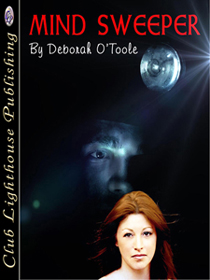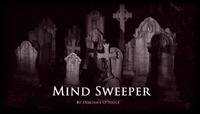Mind Sweeper
Mind Sweeper by Deborah O'Toole is a haunting mystery suspense novel released by Club Lighthouse Publishing in 2022.
Newly-widowed Beth Mills accepts an outpouring of sympathy from her community after a freak mining accident takes the life of her husband, Aaron. Unbeknownst to anyone, she is secretly delighted that her cruel husband is lost to her, but never expects his vicious ghost to return and haunt her in more ways than one.
From Chapter One
June 2007
Timely Cataclysm
BETH MILLS WINCED when she heard Louise Martin's anguished sobs. The grief and tension in the room was highly palpable, leaving no one immune. Beth averted her eyes from Louise, dipping her head to stare at the floor. It was best not to interact with anyone unless she had to.
She heard a door open and close, but refused to look up. The room grew hushed except for the sounds of intermittent sniffling, and then the somber voice came.
Beth knew it to be her husband's employer, Misty Canyon Mines owner Bob Palmer.
"The current bore hole drilled to the floor of the mine has given us additional information," the voice was hesitant, as if reluctant to continue. Beth took this as a good sign. "We dropped the camera down and found three lifeless forms."
The entire room gasped, as if everyone present had drawn breath at the same moment. Beth was silent, still staring at the floor.
"I'm sorry to say we have assumed the remains to be that of Tomas Martin, Kevin Reardon and Aaron Mills," Bob said, his voice cracking with emotion. "We can't be one hundred percent certain because of external damage to the bodies, but it stands to reason as all three men are missing. We haven't accounted for John Mejza and Al Pierce. At this point, we have no reason to believe any of the trapped miners will be found alive."
Louise Martin's sobs began anew while Annie Reardon cried out, rocking back and forth in her chair. Other women rushed to Annie's side, trying to comfort her. She folded into their arms.
Beth Mills displayed no outward show of emotion at the announcement of her husband's name. She continued to stare at the floor, moving her feet around in little circles, her heels lightly scuffing the hard surface.
Floors were funny things, Beth thought idly. The Community Center's concrete floor was a god-awful patchwork in lime-green, with chips missing here and there. She remembered the May Day Dance just three weeks ago when Aaron swung her to his side, his beer-laden breath hot and repulsive on her face. She recalled the angry glint in his eyes; she remembered the pain of the bruise on her back, of his balled-up fist striking her over and over just a mere few hours before the dance. He always made sure to leave her visibly unmarked, hitting her in places that would never be exposed to public gaze.
"Bethany?" Bob Palmer was talking again, but this time he was sitting next to her, his hand touching her arm lightly. "Bethany, I am so sorry. I am so very sorry. Is there anything I can do for you?"
Beth fought the urge to laugh out loud. Instead, the sound was muffled as she covered her mouth with her hands.
Bob took her display as grief, sympathetic to her attempts to mask an outburst. "Is there anything I can do?" He repeated quietly.
She finally looked up, staring at Bob. His iron-gray hair was unkempt, and there were deep shadows under his brown eyes. She wanted to laugh again, but held her hands firmly to her mouth.
"You have already done the best thing you could ever do for me," she wanted to say. "You waited too long to drill the bore hole into the mountain and in all likelihood my husband suffocated to death. Or was he crushed by the cave-in? Whatever the case, you have liberated me from a monster, from a pig of a man."
Instead, she moved her hands away from her mouth and whispered: "I don't know what to do. I never imagined this would happen. What am I supposed to do now?"
Bob gazed into Beth's damp blue eyes and felt a wrench in his heart. He had been plagued by various stages of guilt since the Misty Mountain Mine collapse six days ago. He felt great sorrow for Beth because he admired Aaron Mills, who was known in the community as a man of great character and ethics.
"I can help you, Bethany," Bob told her consolingly. "Whatever you need me to do, I'm there."
She stared at him again. "For starters I need you to stop calling me Bethany," she thought with sudden viciousness. "Aaron called me that, and I hated it. He called me Bethany when he shoved my face into the toilet, and when he pushed my hand onto the hot stove element. He called me Bethany when he sodomized me with a beer bottle, and when he dry-shaved my privates. Please don't call me Bethany. It's Beth . . . Beth . . . Beth."
Bob took her silence as shock. He reached for her hand as she lowered her head. He studied her short-cropped auburn hair, taking in the beginnings of silver at the temples. He knew she was at least forty years old, but despite the bits of gray she looked like a girl in her twenties.
"I need to get out of here," she spoke without looking up. "I need to go home."
"Let me take you," he suggested.
She shook her head. "Thank you, but no. Please, I need to be alone. It's best if you stay here to comfort the others."
He nodded in understanding. "Of course, Bethany. I'll call and check on you later, okay?"
"I'll be fine," she said. "I just need to be alone to wrap my head around this, to try and comprehend . . ."
"Let me walk you to your car," he said as they rose from their chairs.
She refused his help. "I can manage, honestly. I need some air, some space . . ." she purposely let her words trail off, hanging her head again and covering her mouth with her hands as the grin threatened to spill.
"I'll call you later," he repeated.
Bob Palmer watched as Bethany Mills walked away from him, his eyes sad. She was such a lovely woman, tall and slender with a naturally poised grace and lightness of movement. He continued to observe her as she made her way through the room, accepting condolences from all who approached her. While she seemed to be in an understandable state of shock, she was managing better than he hoped.
Bethany and Aaron were a familiar sight in Ivytown. They regularly attended church services and community events, typically holding hands and conversing freely with the locals. Aaron was a native son of Ivytown and thought of as a natural leader and a man with a highly compassionate nature. He volunteered countless hours of personal time to the Community Center, often with Bethany in tow. His loss was a great blow to the close-knit mining town.
Twinges of guilt surged into Bob again. The influx of emotions had become a familiar state of affairs for him in the last six days. While he knew Misty Canyon Mines met all safety guidelines, sanctioned and otherwise, he could not help but feel responsible for the disastrous cave-in. Miners bonded like family, and Bob felt each loss personally, to the core of his being. He doubted the community would ever truly recover from the tragedy.
![]()
A HANDFUL OF journalists waited for word outside Ivytown's Community Center. Most of them were local, with only one television crew from Portland. The magnitude of the mine accident was not nearly catastrophic enough to warrant national attention. The assembled media had been waiting all night, receiving only scattered bulletins from Bob Palmer every few hours. The updates were not reassuring, nor were they deeply informative as of yet.
When Beth opened the doors of the Community Center, reporters looked at her expectantly. One stepped forward with microphone in hand, but Beth waved him away. "Sorry," she murmured. "You'll have to wait for Mr. Palmer. I don't have any news for you. Please, let me by."
The reporter stepped aside, while others in the group refocused their attention on the double doors of the Community Center to resume their waiting game.
Beth breathed in the night air, grateful to be away from the benevolent support of those inside the Community Center. She felt as if she would snap if she had to endure another murmuring conversation or light pat on the arm. It was unbearable.
"If there is anything I can do . . ."
"Aaron was such a wonderful man . . ."
"I am so sorry for you loss . . ."
"Please let me know if there is anything I can do . . ."
The words racked her brain as she reached her dark blue Bronco in the parking lot. She slid into the driver's seat, closing the door and locking it. She rested her forehead on the steering wheel, trying to gather her thoughts before she drove away.
Her reality came with sudden clarity. She was free. She was finally free of the monster everyone called her husband; she was liberated from the pain, the pretense and the violence. Seven years of subterfuge fell away from her in a clean wash, brought about by a blessed natural disaster that no one could have predicted.
She wasn't thinking of the other families suffering through loss today. Truth be told, she did not feel she was suffering at all but was rather elated by the seemingly impossible turn of events.
She smiled, her forehead still resting on the steering wheel. Days of anticipation and hopeful, tortured waiting had left her tired and drawn earlier, but now she was energized and renewed. Her battery was fully charged and she couldn't wait to run with it.
Beth started the engine and drove her Bronco out of the parking lot slowly. She saw others leaving the Community Center for their respective cars, but she studiously avoided them. Once she reached the road, she turned left and accelerated.
It was a dark, warm night, the stars bright in the sky. Her headlights stared down Main Street, glossing over the painted yellow divider lines. She had made this trip many times before, more often than not with Aaron. Their home next to Ivytown's only cemetery was a five-minute drive from the Community Center.
She balked at the location when Aaron first brought her to Ivytown, but then fell in love with the old structure. It took her a bit longer to realize Aaron liked the locality so no one could hear her screams.
The house itself was a dream. Aaron inherited the family property many years ago - long before he met her - and it contained a quintessential two-story turn-of-the-century sandstone abode. The attic included storage and a large, finished area which Beth used as a sewing room. It had been her one true salvation to retreat into "Bethany's Tower" as Aaron called it, a place where she could make her own clothes and achieve relative peace while needle-working and knitting.
Aaron scoffed at her favorite pastimes, rarely coming into her retreat. However, this did not stop him when he was in a battering mood: he simply dragged her by the hair from the attic to pummel her on the darkened staircase leading to the second floor. She always assumed he did not beat her in the attic because he was afraid of accidentally sticking himself with the many needles lying about.
"The prick was afraid of being pricked," she thought with some humor.
A mile from the Community Center, Beth realized she was alone on Main Street. No cars were coming toward her, and none were behind her. A great relief flooded her body as she allowed herself the mirth she had been containing since learning Aaron was presumed dead.
The sounds of her laughter were muffled in the Bronco, bouncing off windows and drowning out the air conditioner. She snorted at the end of another round of giggles, causing her to laugh even harder.
She tasted salt as tears of joy streamed down her cheeks. She wiped her eyes and felt the stinging contact of her salty flesh. She sniffled, coughing on another laugh with a wide smile.
Then her voice came fierce in the confines of the Bronco: "The son of a bitch finally got what he deserved," she spat aloud. "And I didn't have to lift a finger. I hope he suffered full terror before life left his useless body, and I pray his last thought was of me, alive and well without him."
Copyright
MIND SWEEPER ©Deborah O'Toole. All rights reserved.
"Mind Sweeper" may not be reproduced in whole or in part without written permission from the author. "Mind Sweeper" is a work of fiction. Any resemblance to actual persons living or dead is purely coincidental.


